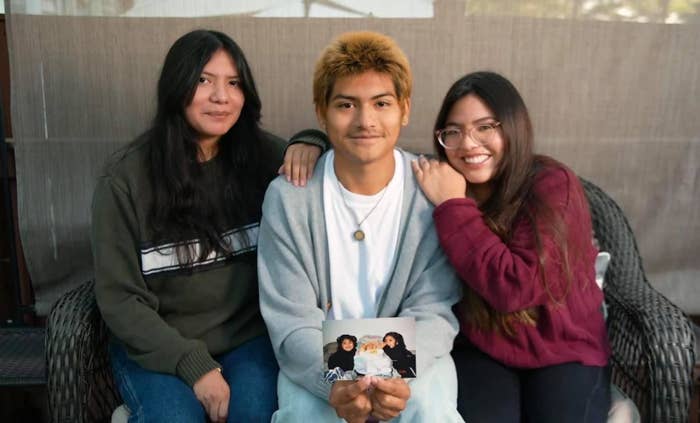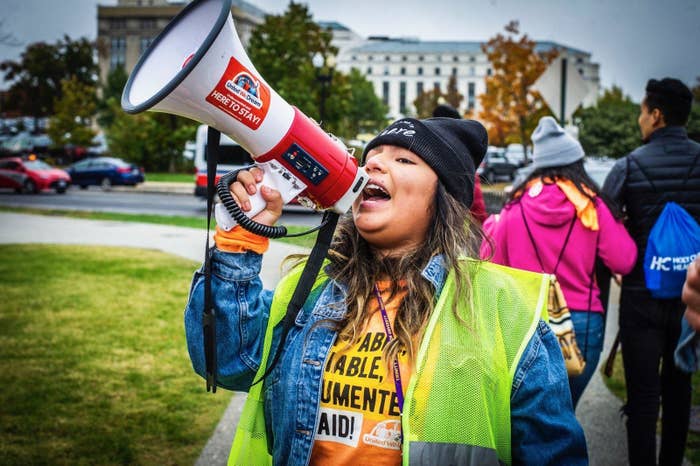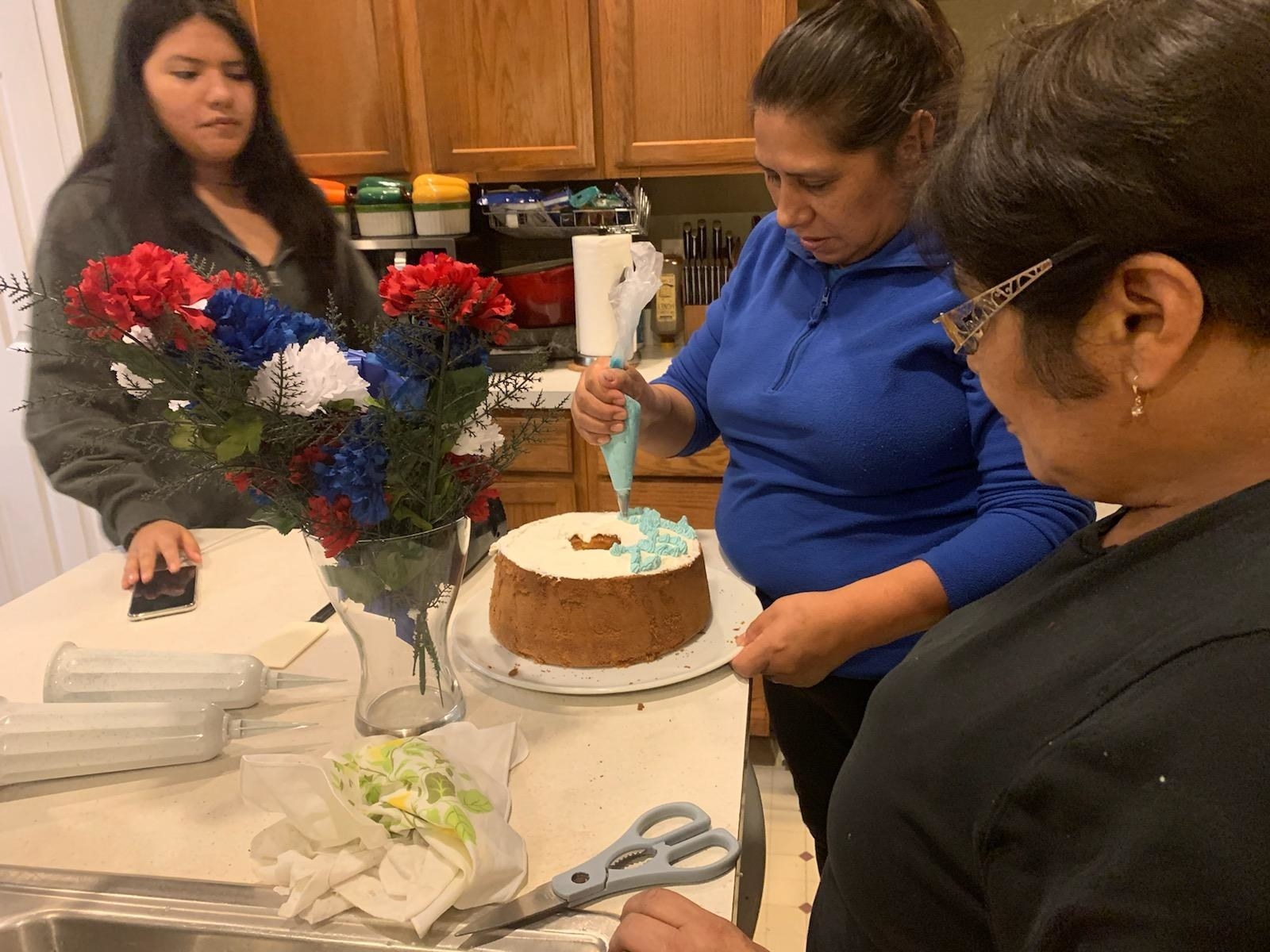
People across the US were on edge Tuesday night watching election results trickle in amid continued uncertainty, but for Luz Chavez, the agony was on a whole other level.
As a young immigrant whose place in this country has been repeatedly threatened by the Trump administration, her future hangs in the balance.
“A lot of people look at this election as picking between two evils again, but in fact, for me, it's knowing my future and my certainty in this country,” she said. “Every single policy put in place by folks that people elect into office directly impact my family, my community, and directly impact me. There's so much at stake here.”
Chavez, 23, is a recipient of the Deferred Action for Childhood Arrivals program, or DACA, one of the landmark initiatives of the Obama administration. She was brought to the US illegally from La Paz, Bolivia, in 2002, when she was 4 years old. She didn’t know she was undocumented until 2013.
BuzzFeed News has journalists around the US bringing you trustworthy stories on the 2020 elections. To help keep this news free, become a member.
Since Trump was elected in 2016, he has repeatedly made efforts to repeal the program and deny benefits like federally backed housing loans to the roughly 700,000 DACA recipients.
When those attempts were, at least temporarily, knocked back by the Supreme Court in June, the administration took another route to undermining the program, reducing its duration and not accepting any new applications.
DACA has been a lifeline to Chavez and is fundamental to the way she’s been able to study, work, and think about her future.
So on Tuesday evening, as crowds gathered outside the White House half an hour away, Chavez was with her family at her aunt’s house in Gaithersburg, Maryland. Her mom and her aunt were cooking milanesa, while her younger cousins played games in the living room and her dad and uncle sang Latino ballads.
“Being with my family tonight, it's my healing. It's my coping mechanism, being able to be with loved ones during times of hardship,” she said. “Whatever outcome happens, we're still going to be here together, and we're gonna keep on fighting. My family won't stop until we're all protected.”
As the night wore on, they were eating, talking, and flipping between MSNBC, CNN, and CBS, bracing for news that could either be a huge relief or devastating.
Chavez’s 20-year-old sister is a DACA recipient, too. Both of her parents are undocumented. Her 18-year-old brother is a US citizen. If Biden wins, it’s not a guaranteed easy road for the family. But if Trump wins, it’s almost certain he’ll once again make moves to attack DACA as he seeks to continue overhauling the immigration system.
“I will say that I’ve seen members of my community deported through every single administration,” Chavez said. What’s different now, she said, is that “we have a president that has been so brutally racist, has been very demeaning toward immigrants, that has been on the track to dismantle DACA.”
Chavez, a youth organizer for immigrant youth advocacy group United We Dream Action, was first granted DACA in 2013, when she was 16. That was also the year she found out she was undocumented.
A difficult few years followed. Despite having DACA and the freedoms that went along with it, she was terrified of what all of these immigration uncertainties meant for her and her family. Then in 2016, when Trump was elected, she knew things were about to become more difficult.
“I had finally accepted the fact that I was a DACA recipient, and I finally was able to achieve so many things with my DACA,” she said. “But my certainty of my future here was taken away that same night four years ago.”
She remembers crying. “My whole life just came crumbling down,” she said.
On Tuesday night, as Trump won Texas and the 2020 margins narrowed, she was again in tears.
Apart from her job with United We Dream, Chavez is in her final year of college at Trinity Washington University, where she’s double majoring in political science and sociology. She’s considering going into education policy, particularly to focus on closing gaps in quality and accessibility of education for Black and brown kids.

When the coronavirus pandemic hit in March, both Chavez’s parents and her two siblings lost their jobs. Suddenly, she was supporting her family of five, making sure there was food on the table and that they could stay in their home, while also trying to finish college. She also worried about her parents not having health care in the midst of the pandemic due to their immigration status.
“I became the sole provider of my family overnight,” she said.
Chavez’s younger brother, Teddy, voted this year for the first time. Chavez said she was surprised by just how plugged into politics he has become.
“My parents were so proud about him registering to vote. Once he got his voter registration card, my dad laminated it, he put in a little frame, and when he went to go vote a couple of days ago, he actually came back with four ‘future voter’ stickers for my family," she said.
“He dedicated his vote for my family.”

With the results still far from certain in several key states, Chavez’s family sat around a table, glued to their phones, laptops, and the TV, while eating the cake her mom and aunt baked and frosted with the words “Biden 2020.”
Late Tuesday, Chavez was still optimistic that Biden could win, but reluctant to jump the gun with many votes still left uncounted.
“I don't want to celebrate. It’s still very fresh,” she said. “Worried this would change once the mail-in ballots came in! But I’m hopeful that the community won.”
